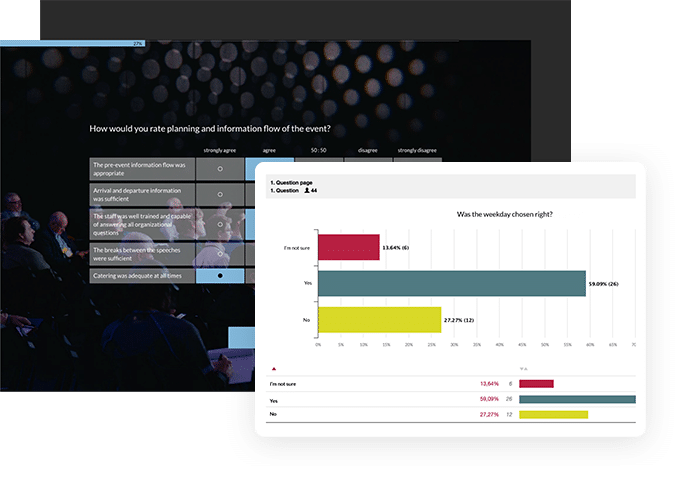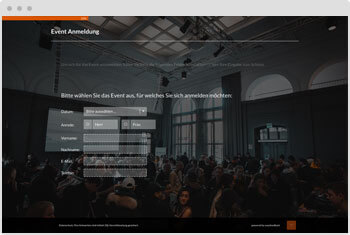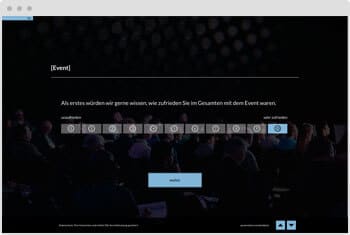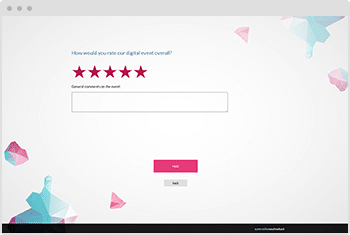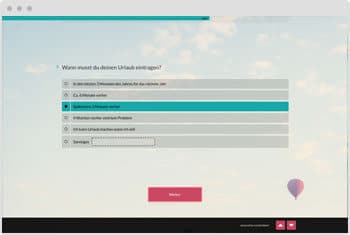More success for your events? Start with feedback from surveys.
Free templates, expert tips & results in real time – with easyfeedback you create GDPR compliant surveys for events like workshops, seminars, trainings and more.


Thousands of companies have already created surveys with easyfeedback. And more companies are joining every day
Why conduct event evaluation?
Successful events are characterized by the fact
that the quality of the content offered is always high. This means that the interests, wishes and expectations of the individual participants are met in the best possible way.
Make your event a success by collecting and evaluating feedback from your participants before, during and after the event and optimizing your offering based on this feedback.
Use interactive online questionnaires for registration and organization, determine needs and ultimately convince your participants with an eventful added value.

Offer & organization
The success of an event depends on many different factors: Organization in advance and in between, catering offer, trainer and seminar leader, time schedule and many more. Let the participants evaluate individual points in order to optimize the success of your events in the long term. After the event is before the event!. After the event is before the event!

Target-oriented planning
Give your participants the opportunity to register before the day of the event and express their needs, expectations and wishes for the upcoming event. In this way, you receive the exact number of participants and can align your event planning directly with their wishes.

Interaction with participants
With an event evaluation, you show participants how important their opinions and suggestions are to you. On the one hand, the interaction shows genuine interest and, on the other hand, you get the chance to find opportunities for improvement through ideas and constructive criticism.

Sustainable success
Through continuous event surveys, you have the optimal tool to lead your event to sustainable success, through the increase in quality and experience. This success is reflected in the increased recommendation rate and the increased number of bookings for your event.
Highlights of the easyfeedback survey software
Device-independent use
Survey your event participants wherever they are. easyfeedback automatically adapts to the respective end device without you having to make any further settings.
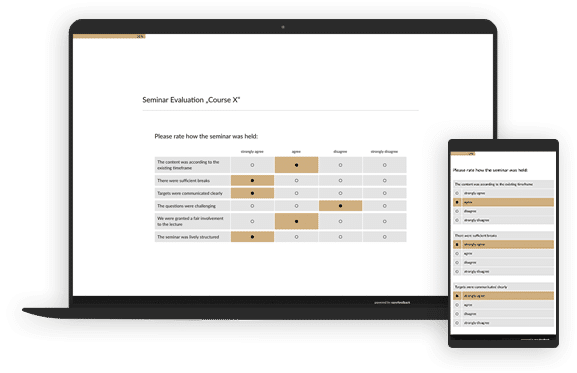
Real-time evaluation
Evaluate the results in real time, present them directly on site and discuss the survey results with your event participants. Or create individual reports afterwards. Simply export with a click or share via link.
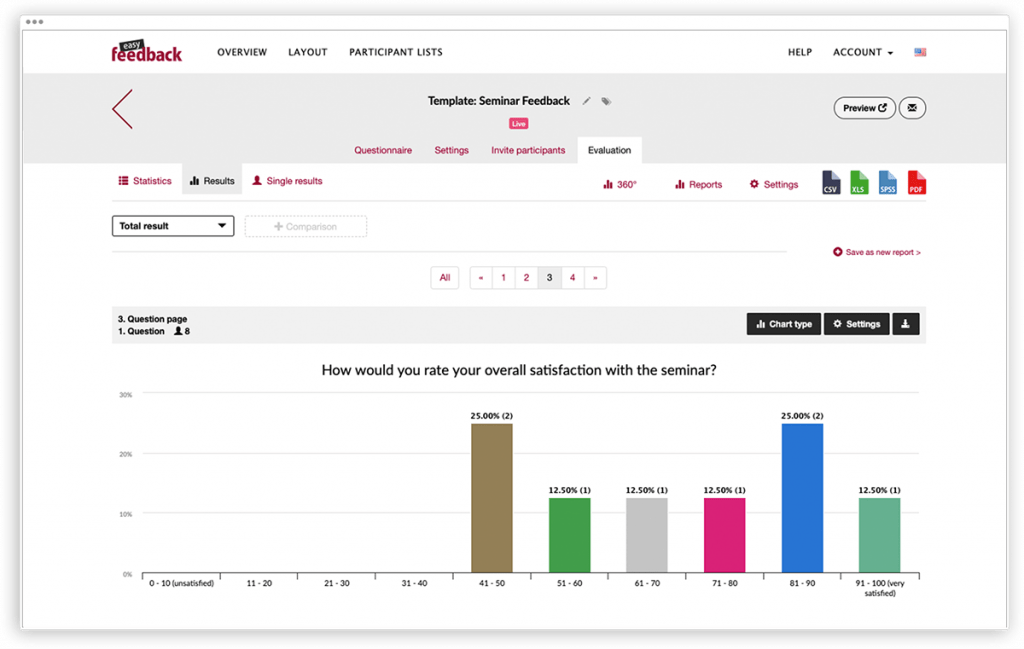
Anonymous or personalized
Get anonymous feedback on your event, or use different options for automatic personalization – you decide how much data you need for evaluation and queries.
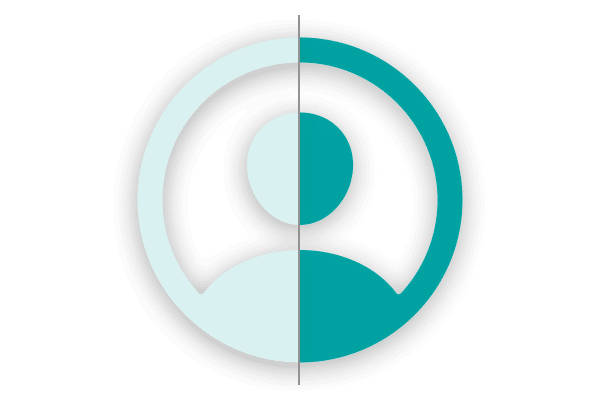
Data protection
As a German provider of online surveys, easyfeedback consistently relies on data protection in accordance with the General Data Protection Regulation (GDPR): server location in Germany (ISO27001), trained employees, data protection officer and other security measures.

Planning & evaluation make your event a success
Event registration
Instead of a collective email or specially developed registration website, you can manage the registration for your event in a structured way with a short survey. Short queries are quickly created and help you organize the event.
Event feedback
Travel & event planning
Whether events or travel, every planning has its own challenges. For events, there are program sequences, service providers and regulations that must be adhered to. When travelling privately or on business, especially with several people, you will get different opinions about the course of events and the destination.
With a preliminary survey you can ask for interests and ideas and have them voted on by the majority. Thus you receive clear statements that make planning and organisation easier.
The more detailed each person describes their particularities, the easier it is for you to coordinate. Save yourself the trouble of contacting each one individually and use the collected feedback to better plan your event or trip.

Choose the right plan for your event survey
The easyfeedback plans are ideal for small and large companies and for one-time or recurring event surveys.
For those who are just starting out with online event evaluations, the starter plan is ideal. For those who want to compare results with groups or at trainer level, the Business plan is a suitable choice. And for company-wide use, the Company plan offers the best value.
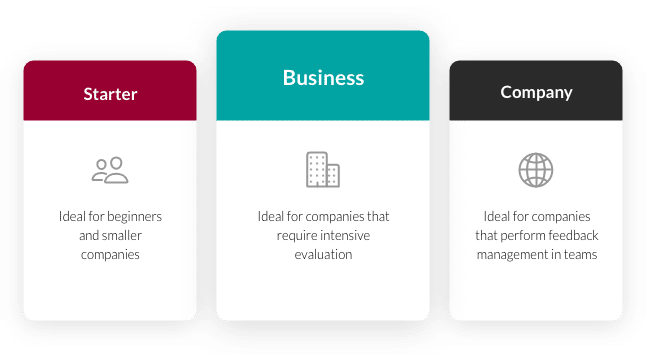
Tip: Increase response rate
Towards the end of an event, the participants’ attention level drops and some of them already mentally drop out. To achieve the highest possible response rate for your event evaluation, present the results in the last item of the program. This creates an incentive to increase attention once again and obtains more evaluations in advance, since the participants are already eagerly awaiting the evaluation.
Weiterführende Artikel zum Thema Event- & Seminarbewertungen
Almost everything you need to know about seminar surveys
1. What does seminar evaluation mean? Technical term, meaning and goal
Basically, a seminar evaluation is a subjective judgement of an interactive learning and teaching event in which a seminar leader or trainer imparts and deepens knowledge on a specific topic to a group of people. The participants of the seminar are actively involved in the learning and teaching event. This form of knowledge transfer is often offered for professional training.
Mostly a seminar is a one-time event, which is carried out in one day. Depending on the content of the topic and the intensity, it can, however, also be spread over several days. In addition to theoretical content, practical parts such as role-plays, teamwork or discussion groups are also included in the learning and teaching event, for a more effective learning experience. At the end of each seminar there should be a seminar evaluation that captures the impressions of a participant.
The goal of the seminar evaluation is to use the insights and potential for improvement gained from the evaluation to sustainably increase and maintain the quality of the seminar offered.
2. What is the difference between a seminar, a workshop and a conference?
The three types of knowledge transfer differ fundamentally in the methodology of how knowledge is taught.
In a seminar , the contents of the event are taught in stages over a longer period of time. For this purpose, both theoretical and practical contents are used for teaching.
A workshop, on the other hand, is an event similar to a seminar, but in which the content of a specific topic is developed by the participants themselves, in cooperation and moderation with the workshop leader. The elaboration is carried out with the help of practical exercises such as presentations and discussion groups.
A conference (synonyms: congress or meeting) differs from a seminar in that it is planned over several days, is a group of several people working on the same topic and knowledge transfer takes place through lectures, presentations, workshops and panel discussions.
3. Why do I need a seminar evaluation?
By means of a seminar evaluation, you will gain important insights into the quality of the event and find out which optimization potentials still exist from the participants’ point of view in order to improve the offer and the quality. This includes not only the evaluation of the theoretical contents and practical methods, but also the assessment and measurement of the ability of the seminar leader, as a lecturer and coach, as well as process and organizational framework conditions.
4. When is the best time to get feedback? Afterwards, when everyone is at home? During the event? What are the advantages and disadvantages of the possibilities?
There are different times to obtain appropriate feedback from the seminar participants. You can, for example, ask the participants about their expectations, interests and needs a few days or weeks before the seminar starts in order to adapt the seminar based on this. In this way, you will increase the success of your seminar immensely, since you as a service provider will meet exactly the expectations that the seminar should ultimately be about.
Another possibility to get feedback from the seminar participants would be on the seminar day itself. For example, you could collect feedback after each item on the programme, during coffee breaks or before the last item on the seminar programme. This has the advantage that, on the one hand, the seminar participants are likely to answer the questions on the questionnaire more attentively and carefully. In addition, instead of a long questionnaire, you can pack your questions into several short interviews and distribute them during the individual breaks for completion. The results could be discussed at the final meeting and individual points could be dealt with more specifically.
Another way to get the feedback that is so important for you would be a few days (not weeks) later after the seminar has taken place. At that time, the seminar participant has most likely processed the teaching and learning content conveyed in the seminar, possibly gained initial practical experience in its implementation and formed a firm opinion about the seminar offered.
It would be even better, however, to use surveys at all points of the event (before, during and after the seminar) instead of just collecting feedback at a specific point in time during the seminar. This way, you will receive continuous feedback and can continuously adapt the seminar in a way that promises success. Don’t be afraid of the possibilities of surveys and use them to optimize your seminar to an all-round successful experience for you and the participants.
Regardless of which option you choose for obtaining feedback, it is important that you make your event visitors aware of the importance of the questionnaire. After all, the aim of the questionnaire is to ensure and increase the quality of your seminar in the long term. Above all, give your seminar evaluators enough time to fill out the questionnaire carefully. Especially if you distribute it after the event. He will most likely not be able to give immediate feedback, but you should still define a survey period with an end date for submission.
Finally, you must also evaluate the questionnaire and define and implement suitable optimization measures.
Tips for evaluating your seminar feedback are available here.
5. How can I get my participants to participate in the evaluation?
On the one hand, you can and should make the participants of your seminar survey aware of the importance and goal of participation. Give them the feeling that their opinion is important for the future success of the seminar. On the other hand, you can also motivate the participants to participate with incentives ,in the form of vouchers or raffles.
But you can also motivate the participants to give their opinion on the seminar in a methodical way. This can be based on the length of the questionnaire, its design or the way in which you ask the participants. The latter is particularly interesting, as you can also obtain feedback in a playful way, for example by means of a quiz.
Furthermore, you can increase the motivation to participate by the type of questioning itself. You can conduct surveys either in the classic way using pen & paper or online, with a modern and unique participant experience.
6. How long should the questionnaire be?
How long a questionnaire for the evaluation of a seminar should be cannot be said in general terms. In general, a questionnaire should be kept as short as possible, as the participants of a seminar usually do not have the time or desire to fill it out. Generally speaking, the longer the questionnaire, the less willing the participants are to fill it out carefully and honestly. In the end, this has a negative effect on the quality of the answers given and thus on the evaluation and interpretation of the results.
So in order to obtain good usable data from a seminar evaluation, the feedback questionnaire should not contain too many questions and should be equipped with simple questions and question types if possible. If you need many questions for a thorough evaluation of your seminar, another option would be to distribute these questions in several short questionnaires and to output them at different times.
7. How long should the questionnaire be?
This depends strongly on the structure and content of your seminar. Nevertheless, the following structure of a seminar questionnaire can be defined as a basic framework:
1. evaluation of the organisation and general conditions
Get feedback from seminar participants regarding the venue, equipment or catering and more. The answers you receive will give you an excellent opportunity to create the environment as well as the framework for an educationally supportive learning atmosphere.
2. evaluation of the seminar leader
The success of a seminar depends strongly on the seminar leader. As a moderator and teacher, he or she must have the competence to teach didactically and also have social skills in order to best fulfil the educational function of the event. Therefore, the seminar leader himself must be evaluated after each event in order to constantly improve the quality of his teaching.
3. evaluation of the contents and the methodical design
Theoretical as well as practical contents of a seminar should not bore the participant and hinder the learning process. Make sure that your seminar is varied and provides added value for the participants. Therefore, it is best to ask before the event, about the individual interests, wishes and expectations of each participant. After the event, you will then have the opportunity to measure the satisfaction and the degree to which the expectations were fulfilled.
4. praise, criticism and opportunities for improvement
Right here, is the gold of her seminar interview. So don’t be afraid to ask what you can improve on your course in the future. Only through the constructive feedback of your participants you can constantly improve the quality of your seminar.
5. general information
At the end of the questionnaire, you have the opportunity to obtain further relevant information about the participant group. For example, ask about the reasons for participation or about their current professional activities. Such information will help you to market the seminar more effectively to your target groups.
8. How can feedback be obtained automatically?
In addition to the feedback from the seminar evaluations, the organisation is also involved. If you as a seminar provider offer a large number of seminars, the integration of Feedback Management must be as easy and convenient as possible.
At this point easyfeedback offers you different methods. On the one hand, you can use automated parameters on the survey link to control participation via your own system, or you can use the API (connection) provided for your favorite tool and include the invitation and evaluation in your system landscape.
9. How seminar evaluation contributes to improving the customer or employee experience and how this is linked
A successful seminar can definitely increase the own customer (customer experience) as well as the employee experience of the customer (mostly companies).
Both customer and employee experience management are clearly about satisfying the needs and wishes of each individual in the best possible way. If you continuously optimize your seminar with the help of seminar evaluations, you create a positive added value for yourself, your customers and ultimately for the participants.
The goal should be to completely fulfill the (further) educational purpose of a seminar in line with expectations. Especially customers who purchase your service, for example to train their employees in their tasks, should be satisfied with your event in the end. This will have a lasting effect on the booking of further seminars by the same customer.
But also the trained employees would be satisfied with your event, as long as you convey the contents of the seminar in a way that promotes learning and take individual wishes and interests into account. A successful seminar can pay off for companies by increasing employee satisfaction and for you by positive recommendation.



